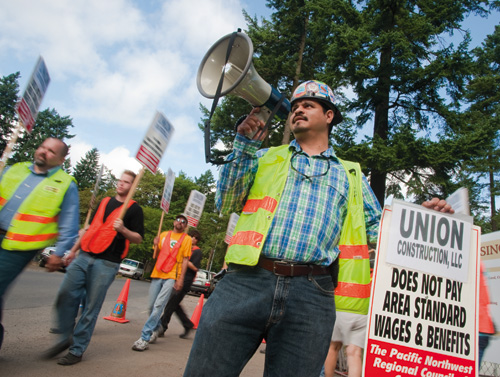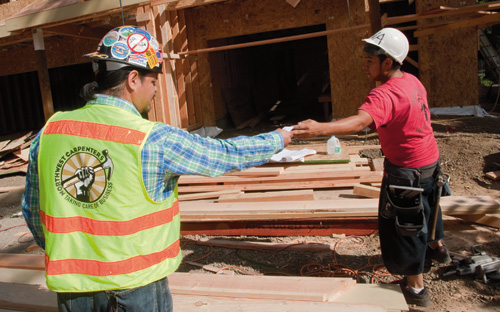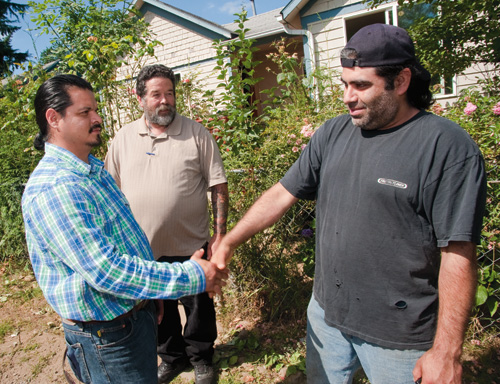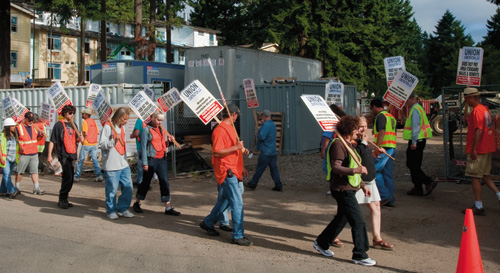 As jobs remain tight, competition stays fierce and Hispanic labor grows, a carpenters union attacks fraud in the construction industry with controversial tactics.
As jobs remain tight, competition stays fierce and Hispanic labor grows, a carpenters union attacks fraud in the construction industry with controversial tactics.
By Ben Jacklet
 |
Juan Sanchez of the carpenters union leads a demonstration at a Lake Oswego building project. The union is taking an aggressive position against underground labor in the construction industry.// Photo by Anthony Pidgeon |
Juan Sanchez is dressed for work in jeans, hard hat, reflective vest and steel-toed boots. But he won’t be hanging any drywall today or pounding any nails. Instead he will be driving from one construction job site to the next throughout the Portland area, looking for cheaters.
Sanchez, a 33-year-old representative of the Pacific Northwest Regional Council of Carpenters, grew up in Acambaro, Mexico. He arrived in Portland 10 years ago with a green card but no English; he couldn’t even order food at a restaurant. He worked a variety of informal, cash-only construction jobs: up at 5:30 a.m. and home by 9 p.m., Monday through Saturday, paid in cash under the table. The workers were mostly Latinos like him; the bosses tended to be white. The money seemed good until he tried to live on it, and he didn’t like not having benefits or rights.
Sanchez joined a union apprenticeship program in 2005, when construction was booming in Portland, and graduated in 2007. Now he spends his workdays attacking the same underground economy that he worked in when he first came to Oregon. “For me, it’s personal,” he says as he programs job site addresses into his GPS unit. “I mean, I’m lucky. I make pretty good wages. I have medical, dental for me and my family, vacation and pension. But what about my kids? Will they have this later? I have to fight to preserve what we’ve gained. Every working person deserves a little bit of the profit.”
The problem is, there isn’t as much profit to go around in the construction industry as there used to be. Activity is picking up slightly but jobs are still relatively few, earnings are down and competition is fierce. The number of union carpenters in the Northwest has dropped from about 25,000 to below 20,000. Concurrently, the Latino presence in the trades has grown dramatically, nationally and in Oregon; a 2008 Pew Hispanic Center study found that Hispanic workers fill two of every three new jobs in the U.S. construction industry. Many of those jobs have moved underground as the federal government has shifted from workplace immigration raids to strict audits of employers suspected of hiring undocumented workers.
 |
Juan Sanchez hands his business card to a non-union carpenter on the job. The carpenters union often helps non-union workers to pursue workplace grievances and back wages.// Photo by Anthony Pidgeon |
Union officials say the exploitation of undocumented Latino labor to cut building costs has become increasingly commonplace amid the desperation. The union that has taken the most aggressive stance on the issue locally has been the carpenters union, using tactics that are not popular with some other unions. The carpenters union was founded in 1881 and has about 520,000 members nationally with 4,600 in Oregon and 19,600 in the Northwest.
Sanchez and his union colleagues have labor disputes with a half dozen local contractors for allegedly shepherding undocumented workers to job sites, cheating workers out of their pay, refusing to pay overtime, threatening those who complain, and running various schemes to evade taxes, win bids through payroll fraud and collect undue unemployment checks. One Oregon contractor they recently targeted, Stephen Nagy, pleaded guilty on July 29 to antitrust and racketeering charges for rigging the bid process for a $24 million Pearl District construction process, fraudulently altering pay stubs and ripping off the state for more than $100,000 in unemployment funds. One of Nagy’s companies, ASM Drywall, was forced by the Bureau of Labor and Industries in June to pay $36,519 in back wages to 40 workers with Hispanic surnames, plus $89,280 in penalty wages and $36,720 for civil penalties. Nagy has been banned from the construction industry in Oregon for 20 years.
Both the criminal prosecution and the back wages judgment against Nagy resulted from underground investigations by local members of the carpenters union. According to a key affidavit filed in the Nagy case, an undercover union member serving as a confidential informant collaborated with an investigator from the Department of Justice to document the wrongdoing. The informant even set up a company with Nagy to bilk the government for $45 an hour in labor while paying workers $15 per hour in cash.
The Nagy investigation followed the 2008 conviction of a Marion County labor broker named Maurilio Vega for racketeering and ducking $8 million in taxes. Vega received $25 million in checks from drywall contractors and paid crews of mostly undocumented Latino workers in cash, to launder money and enable contractors to evade taxes and save on workers’ compensation and labor costs.
 |
Juan Sanchez and Rudy Martinez of the carpenters union shake hands with a worker who received back wages from an employer.// Photo by Anthony Pidgeon |
At the first job site Sanchez visits, a Latino worker tells him he doesn’t know who he works for, but he is happy to be earning $15 an hour. At the second site the supervisor politely denies Sanchez access. At the third site, the foreman changes his story suspiciously. First the foreman says the workers are paid by the square foot; then he says they are paid by the hour, and claims not to know how much his own workers are getting paid.
Sanchez jots down details when he returns to his vehicle: the name of the supervisor, the subcontractors on site, how long the job is expected to last, the workers he spoke with and what they said. He never asks about immigration status. “It’s not something we ever ask about,” says his colleague Evelyn Shapiro-O’Connor, who helped train Sanchez and conducts similar investigations in Seattle. “The law says the workers deserve to get paid if they do the work. That’s not an immigration issue.”
Later, Sanchez’s notes will get entered into a union database that tracks the industry. “We know about every job that’s going on,” Sanchez says as he drives from an apartment in Northwest Portland to a shopping center in Beaverton.
At each site Sanchez hands out business cards to supervisors and workers alike. “You never know what will happen to those cards,” he says. One time his card found its way to a worker who was making low wages building a new school. The worker contacted Sanchez under a false name at first, then got back to him later using his real name, and eventually went through BOLI to collect $30,000 in back wages for his crew. It turned out that the subcontractor was charging “prevailing wages” of over $40 per hour for the publicly financed job but paying workers far less.
Often acting on union tips, BOLI has conducted more than 1,000 investigations into alleged prevailing wage rate fraud since 2005, and collected more than $5.8 million in back wages. Brad Avakian, who has served as commissioner of BOLI since 2008, says most labor law violations occur within industries that employ many immigrant workers such as construction. “A lot of these folks don’t have a network of support, and it’s very easy for employers to take advantage of them,” says Avakian. “It’s a real problem, and the millions of dollars that we collect in back wages for workers proves that it’s a problem.”
 |
The carpenters union is known for staging aggressive, long-running demonstrations against contractors over labor disputes.// Photo by Anthony Pidgeon |
In response to the problem, the state in 2009 granted new training and collaborative powers to a “compliance team” of investigators from the departments of employment, revenue and consumer and business services as well as BOLI. The compliance team shares information to crack down on the underground economy and restore lost tax revenues. As with the union officials, Avakian says the state does not investigate whether or not the workers are undocumented. “It’s irrelevant from our standpoint,” he says. “If a worker is on the job, they are entitled to get the legal wage that they’ve earned.”
Avakian says he often hears complaints from contractors who play by the rules only to get beat out by cheaters.
Mike Salsgiver, executive director of the Oregon-Columbia branch of the Association of General Contractors, says the underground economy is “not an issue of concern to our members. We’ve put a lot of resources into making sure our members have the tools to comply with the law.”
Other contractors such as Mike Roach, president of Western Partitions, say they are extremely familiar with the problem, and sick of it. Western Partitions is a Portland-based contractor with offices in Eugene, Spokane and Seattle. A few years ago the firm had about 1,200 people working on various sites throughout the Northwest; now that’s down to about 500.
“We bid on prevailing-wage jobs and get beat by substantial dollars,” Roach says. “There’s no way they’re not cheating. If they’re not paying taxes, workers’ comp or benefits, they have a huge edge on you.Some of these people are in it for 10 bucks an hour. I was making 10 bucks an hour in the trades back in the ’70s. You just can’t compete with that.”
Most of the Latino workers Sanchez talks to on job sites around Portland are earning about $12 an hour, down from $15 a few years ago. Union apprentices in Oregon start at around $18 per hour, with benefits; with experience wages and benefits rise to over $42 per hour.
Later in the afternoon, Sanchez checks out a job site in Lake Oswego where his union has a dispute with the drywall subcontractor. His conversation in Spanish with the employees there is tense and terse.
“They are hard-core employees,” he says as he heads to the job site trailer. “They feel loyal because they are happy to have work.”
“See you on the picket line,” says the project manager with a grin.
Sanchez maintains an easy rapport with most of the people he speaks to, but not everyone is a fan of his union’s tactics. Months before Nagy pled guilty, demonstrators routinely gathered in front of the offices of Portland contractor S.D. Deacon to declare him guilty, with a huge poster showing Nagy’s mug shot. And these demonstrators were not necessarily union workers, since the carpenters union hires day laborers for political work, including homeless people who are not union members. That tactic does not sit well with some union members. One commenter at Oregon Business’ website, oregonbusiness.com, responded to a news story about the campaign by charging that the carpenters union had mob ties and “recently closed all Locals and tossed all delegates who were elected by the membership out of office and installed hand-picked yes men.”
Those charges are not as outlandish as they sound. The carpenters union does have documented historic connections to organized crime (in New York) and the Pacific Northwest Regional Council did recently replace local delegates in a major restructuring following charges of financial impropriety. The carpenters are not members of the national AFL-CIO union coalition or the local building trades council, and have quarreled with both groups over organizing tactics and strategy.
John Mohlis, executive secretary of the Oregon State Building & Construction Trades Council, says: “There is a bit of friction [between the carpenters union and others in the building trades], but we try our best to have a working relationship with them, because we’re signatory partners and our members work the same job sites as theirs do… It definitely complicates things.”
Jimmy Matta, the top official of the Pacific Northwest Regional Council of Carpenters, based in Kent, Wash., offers no apologies about the aggressive tactics his union employs. “We are passionate about cheaters,” he says. “We are passionate about crooks.”
Matta led a hard-nosed campaign against underground construction labor in Seattle that pointed fingers at a development company owned by billionaire Paul Allen, among other targets. He says one goal of the recent restructuring is to replicate those tough tactics in Portland. “We built a strong track record in Washington, and we’re going to do the same thing here,” says Matta.
Sanchez echoes that sentiment as he returns to the Portland office at the end of another day of watchdogging job sites.
“Some people say we’re bullies,” says Sanchez. “They say we just want our way. But we are fighting for what is right. And we are not going to stop.”


